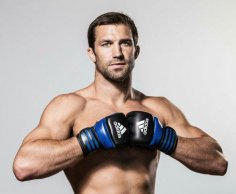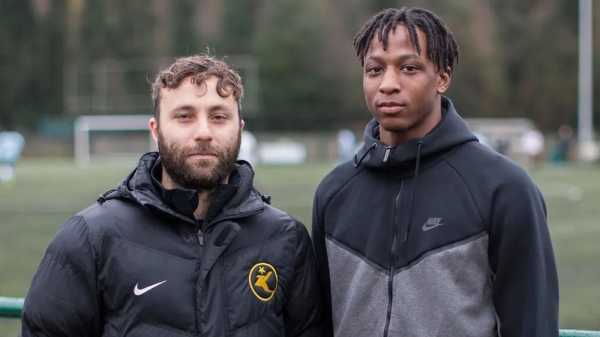
It is a scorching afternoon in the Buckinghamshire countryside and, in a behind-closed-doors friendly at Wycombe Wanderers’ training ground, a Wycombe development squad are taking on a team from the Kinetic Academy in south London.
The fixture has been arranged by the League One club to allow manager Gareth Ainsworth and his staff to assess a group of young Wycombe trialists, but it is also an opportunity to run the rule over the latest crop of Kinetic graduates. There is talent among them.
Kinetic emerge 2-1 winners, dominating much of the game and scoring a goal in each half before Wycombe net a late consolation. More important than the result itself, though, is what comes from it.
“Success for me today is them asking us, ‘Who’s he? Who’s he?'” says Eddie Munnelly, Kinetic’s head of coaching, as he gives a team talk to the group by the side of the pitch. The idea, Munnelly adds, is to “put the players in the shop window”.
- Download the Sky Sports app | Get Sky Sports
- Watch Premier League highlights | Play Super 6 here
- Analysis: Ten Hag has his template for Man Utd now
The exposure pays off.
Trending
- Transfer Centre: Man Utd set £80m Antony budget
- Papers: Man Utd plot Depay reunion
- Carabao Cup third-round draw: Man City host Chelsea; Liverpool face Derby
- CL group-stage draw: Who could English and Scottish sides face?
- Auba, Depay and De Jong feature for Barca in 3-3 draw with Man City
- Scorecard shows AJ was winning Usyk fight after nine rounds
- Jota: I didn’t believe I could reach Liverpool
- Nice agree loan deal for Arsenal forward Pepe
- Essential Football: Chelsea’s overhaul examined
- Bailly joins Marseille on loan | Man Utd hold Dubravka talks
- Video
- Latest News
Kinetic co-founder Harry Hudson can be seen deep in conversation with a member of Wycombe’s coaching staff after the game. He later reveals two Kinetic players have been invited for trials. “I think they should have taken more,” he tells Sky Sports with a chuckle.
Others will have the chance to showcase their ability elsewhere.
Also See:
Richard Asamoah, a marauding left-back described as “the next Omar Richards” by one of his team-mates, has an offer from Gillingham. Sol Baugh, a technically gifted midfielder who previously played in Charlton’s academy, is attracting interest from Bristol City.
The players, mostly aged 18 or 19, hope to follow in the footsteps of past Kinetic graduates such as Joe Aribo, who completed a £10m move from Rangers to Southampton last month, and Richards, an £8.5m signing for Nottingham Forest from Bayern Munich.
Twitter Due to your consent preferences, you’re not able to view this. Open Privacy Options
Aribo, 26, and Richards, 24, were team-mates in Kinetic’s early years. “That was a top group,” says Hudson. Fast forward to today and the academy has helped a total 62 young players from some of London’s most underprivileged areas earn professional contracts.
“We had our highest number of professional signings last year, with 13 boys moving through the programme and into professional academies in one season,” says Hudson.
“That is a higher rate than you would get from most Category Three academy scholars into first teams,” he adds. “So that is something we’re very proud of.”
Twitter Due to your consent preferences, you’re not able to view this. Open Privacy Options
It has earned Kinetic a stellar reputation.
The game against Wycombe is just one of many they will play against Football League and Premier League opposition over the course of the season and there is growing interest from further afield too.
“We are working with more and more European clubs,” says Hudson.
All of them are searching for hidden gems.
How the riots provided the spark
Kinetic’s origins can be traced back to the London riots in 2011, when the police shooting of Mark Duggan, a 29-year-old Black man from Tottenham, caused a wave of social unrest across the capital.

Image: Croydon was one of the worst-affected boroughs during the London riots in 2011
Hudson had a first-hand view of the violence in Croydon – “I could see Reeves Corner on fire from my house,” he recalls – but it was the subsequent fallout which spurred him into action.
“The rhetoric coming out of the media outlets was very much around these young people being bad kids,” he explains. “‘They are born this way, lock them up and throw away the key.’
“From my experiences, both as a young person growing up in south London and someone working on social inclusion projects, I knew that wasn’t quite right.
“It was almost like a eureka moment of, ‘We need to do something here, we need to implement something to help these young people change the rhetoric of what society believes about them.”
Hudson formed Kinetic with friend and co-founder James Fotheringham soon afterwards.

Image: Josh Maja, 23, has represented Sunderland, Bordeaux, Fulham and Stoke City since his time with Kinetic Academy
In their first year, they had 25 players aged 16 to 18 signed up to the programme. That number now stands at over 350. Their focus remains in south, but they have expanded into north London too.
Through their full-time programme and community outreach coaching sessions, which are open to players of all abilities from 13 to 16, Kinetic estimate they work with 1,000 young people a week.
“I never would have imagined it would get to this point,” Fotheringham tells Sky Sports.
Football is of course the focus of Kinetic’s offering.
The success of Aribo, Richards and other graduates such as Bordeaux striker Josh Maja, Watford winger Kwadwo Baah and Sheffield United and Wales defender Rhys Norrington-Davies, serves as inspiration for the younger generations.
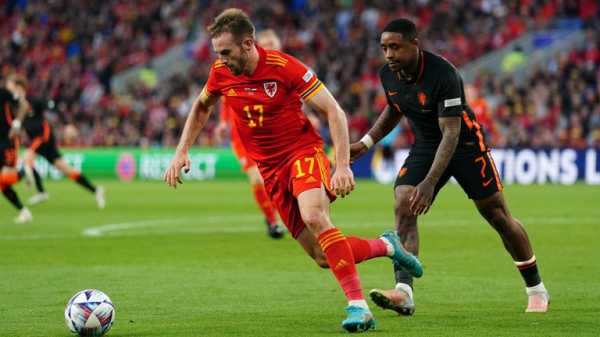
Image: Kinetic graduate Rhys Norrington-Davies in action for Wales against Netherlands
But the academy is also a registered charity, its wider aim being to reduce youth unemployment and steer young people from disadvantaged, inner-city backgrounds away from gangs and criminality.
“That is what we exist to do,” says Hudson.
“Seventy-eight per cent of our young people are from single-parent families and two thirds are from the lowest socio-economic bracket of society, so they tend to have more risk factors attached to the circumstances around them, and that makes them very vulnerable.”
Why education comes first
Kinetic seek to reduce those risk factors not just through football but through education too.
Every player enrolled in their full-time programme must complete sixth-form studies at one of their partnered secondary schools.
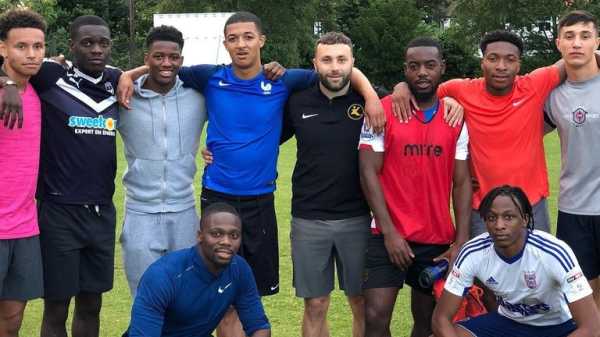
Image: Kinetic Academy co-founder Harry Hudson poses with graduates including Myles Kenlock (top row, fourth from left), who joined Ipswich Town and Joe Aribo (bottom right)
“The data doesn’t lie and it doesn’t look favourably upon kids following their dreams of getting to the Premier League,” says Fotheringham. “The percentage of those who manage it is not large enough to put all your eggs in that basket.
“That’s why our angle with every player as soon as they come through the door is that education comes first.
“We will provide you with everything you want and need on the pitch, but we need you to commit to the course and give as much care to that as your football.”
The aim is to prepare their players for life after Kinetic, and to ensure that if a career in football does not materialise, they get a level of education and work experience, through placements and internships, that would not usually be available to them.
“This is one of the reasons I wanted to run Kinetic,” says Hudson, “because if a young person at 16 – and I use myself as an example – is given the option of doing a menial job, because they haven’t got much education behind them, or going and selling drugs on the corner, and one is going to pay you 16 grand a year and one is going to pay you £400 a day, I know which decision I would make – and I had a fantastic upbringing and fantastic support around me.
“That’s why there is hopefully value in what we do.
“We try and intervene in a young person’s life when they are potentially vulnerable and build as many pillars around them as we can, education being one, football being another.”
Ryan Gondoh is one of many to have benefitted.

The 25-year-old, who grew up on the Roundshaw Estate, not far from Kinetic’s Croydon base, has had spells with several professional clubs since his time in the programme and is now back with the academy working as a mentor.
“I’m from a council estate, so, as you can imagine, nobody really makes it out,” he tells Sky Sports. “Broken dreams and a lot of us come from broken homes, with single parents.
“I was lucky to go into Kinetic when I was 15 or 16, because I was at a crossroads. What do I do? Do I just go on to do silly, naughty things? Or do I go to Kinetic and benefit from it long-term?
“There are a lot of easy paths to go down. You follow a lot of older people. It’s easy to be swayed when you’re around friends and you’re up to no good. It’s fun.
“But you look beyond that and you think, ‘Is this what I want to do with my life?’
“It comes down to people around you. Who is there to help you and guide you? Who is there to give you advice? I was happy that I met Harry and came under Kinetic. I’m fortunate to be here now.”
Baugh feels similarly grateful for his time with Kinetic.
The midfielder is weighing up his next move in football having graduated from the programme this summer but he has other options too. Starting in September, he has been offered a place at the University of Manchester to study English literature.
“I think it’s really good that I’ve had Kinetic,” he tells Sky Sports.
“It’s helped me a lot as a footballer, but being able to get three good A-levels has also given me the opportunity to go to university.
“Having that option has left me in a good position, so I’m not stressed.”
Rebuilding academy cast-offs
Kinetic are well-known for spotting talent in grassroots football but Baugh is just one of many to have come to the programme having fallen out of a professional academy.

Image: Omar Richards joined Kinetic Academy having been released by Fulham and went on to sign for Bayern Munich from Reading, before joining Nottingham Forest this summer
“That’s quite regular,” Fotheringham tells Sky Sports.
“A lot of players who come to us will be released at 14 or 15, who come into evening community sessions, maybe a bit lost on their pathway, maybe feeling they are not good enough.”
It can be a delicate time in a young person’s life.
“For young people who are talented at football, that’s kind of your identity from a young age,” adds Hudson.
“So, when releases happen – and inevitably they do more often than not – a young person has lost their identity and they are very vulnerable.
“You then couple that with the environment of living in a very urbanised, disadvantaged area where gangs are rife and where influences tend not to be very positive.
“On top of that, they typically won’t value their education much when they are younger. Sometimes, in my opinion, professional clubs reinforce that by having day-release programmes from very young ages which devalue an education to a young person.
“So, when they might get released, at whatever age that is, they will also potentially not have much to fall back on because they have pinned all their hopes on being professional footballers.”

Kinetic aim to build those players back up and they do it by placing player care at the heart of what they do. “Professional clubs will now send us releases, because they know we will morally look after the young person, not just the young player,” says Hudson.
Kinetic’s coaches, who also serve as school liaison officers, helping to oversee the players’ progress in education, have a key role in that.
“The staff aren’t just football coaches,” says Fotheringham. “They are the players’ mentors, their role models, whether they know it or not. They are a shoulder to cry on, someone to put an arm around them when things might not be going in the right direction.”
Gondoh experienced that first-hand as a teenager.
“They don’t just get to know you on the football side of things,” he says. “Outside, personal life, growth in life. That’s what they are here to do, to help you not just on the pitch, off the pitch.
“How are you coping outside? How can we help you in your day-to-day life – not just when you come in and around Kinetic?”
Twitter Due to your consent preferences, you’re not able to view this. Open Privacy Options
The idea is that the structure and support provided by the programme will help those young players who suffered rejection from professional academies rediscover their love of the game.
“Then, by the time they get their confidence back again, they might have had a growth spurt, they might have lost some weight, they might have just been unlucky with someone as good as them in their position,” says Fotheringham.
“Opportunities come all around the country and I guess that’s where we are a bit different to others.
“The links the programme has to clubs mean we can give a great opportunity to get into professional football at 16, 17 or 18, whereas if you’re at a club, you’re pigeonholed towards their first team.”
How Kinetic hone street footballers
Kinetic are helped by the fact they operate in a hotbed of talent.
In recent years, the area of roughly 10 square miles stretching from Southwark to Croydon that comprises south London has become one of football’s most prolific breeding grounds.

Image: Kwadwo Baah (right) made his Football League debut for Rochdale aged 16 having spent time with Kinetic Academy following his release by Crystal Palace
“We are blessed, we are very lucky to work with such talent,” says Hudson with a smile. “I think south London is a real melting pot of cultures, which is brilliant for a young player’s development.
“You’re getting African influences, you’re getting Caribbean influences, you’re getting South American influences, you’re getting whatever English influences are still existing. So, a young person is exposed to many cultures and styles of play from a young age.
“There is also a real prevalence of people playing small-sided, cage-based football, which builds quick feet and technique in tight areas, and is very, very physical.
“That means they have to learn to have great balance and guile and you can see that with small players who made it through, like Jadon Sancho and Reiss Nelson.
“They might be diminutive in size, but you can’t nudge them off the ball because they are used to having that really strong core and that low centre of gravity.”
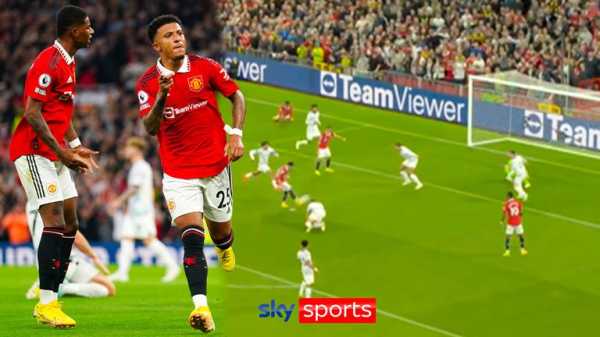
Jadon Sancho, who scored for Man Utd against Liverpool on Monday Night Football, grew up in Kennington in south London
There is an increasing demand for those attributes in top-level football and that demand has led to what Hudson describes as a “changing mentality” in youth development and academy coaching.
“Doing my B Licence as a younger coach, the coaching process was, ‘Stop, stand still, what could you do better?’
“But the players who are being developed in the cages and coming through now, they just want to play, they want to be creative and innovative.
“I think there’s a change in the mindset of academies now.”
The change is better enabling players like those at Kinetic to flourish.
“You have to remember, the young people we work with, a lot of the adult relationships they have are quite negative,” says Hudson.
“That might be a teacher in school because they didn’t value their education. It might be a parent at home who is stretched and doesn’t have the time they should have. It might be a police officer stop and searching them when they are out.
“So, they often have a bit of a barrier up to adults and that means they can be quite defensive when it comes to being questioned or asked to do something different. That can lead to confrontations with ‘stop and stand still’ coaching.
“I think that stopped a lot of players getting through, and it helps you understand reports that come back saying, ‘he’s got a chip on his shoulder’ or, ‘he’s got a bad attitude’.
“They are terms I detest but that’s often the stigma that gets built up around inner-London boys.”
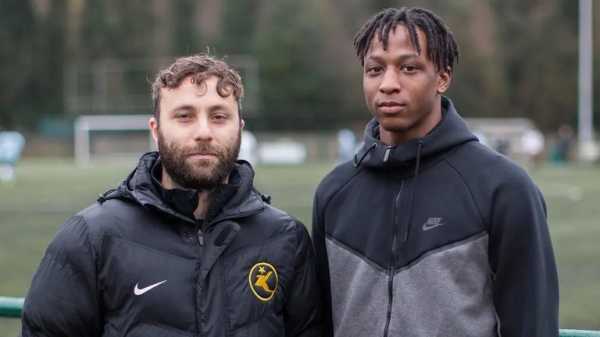
Image: Harry Hudson poses with Kinetic graduate Joe Aribo, who went professional at Charlton Athletic before moving to Rangers and subsequently Southampton
Kinetic’s coaches place considerable emphasis on allowing the players to express themselves. “You have to let them be free at times,” says Hudson. But they are careful not to neglect the tactical understanding required to make it in the professional game.
“That’s a critical part,” adds Hudson.
“When the young people come to us at 16, we see our job as being to take them from – and I don’t really like the word – but a raw product, with good technique, good athleticism and good confidence, into a package that appeals to a first-team manager.
“So, someone like [Wycombe Wanderers manager] Gareth Ainsworth, who is coming down to this game today, will then say: ‘You can play in my first team in 18 months’.
“That means we need to tactically develop them to play within a structure. We ultimately need them to be seen as a product for a professional football club’s first team.”
Pride at watching graduates excel
Kinetic are confident of surpassing their record of 13 players moving into professional clubs in a single season and there is immense pride at watching those who have already achieved it.

Image: Joe Aribo celebrates after scoring for Rangers in the Europa League final
“It is really rewarding and it is something Harry and I reflect on every season,” says Fotheringham. “These are kids that maybe never would have had the opportunity to do that.”
“A couple of years ago,” Hudson adds, “it got to a point where and I could go on Sky Sports on a Saturday and I’d be checking an increasing amount of teams in various parts of the Football League.
“Is one of our players playing? Are they scoring? How are they doing? How many minutes are they playing?
“Sometimes, there are pinch-me moments. When Joe Aribo scored in the Europa League final this year, I was jumping around my house. It was amazing to see a boy from humble beginnings in Merton going on to score in one of the biggest matches in world football.”
The success stories are not limited to those who make careers for themselves in the professional game.
Fotheringham describes the many more who go on to university or into gainful employment as the “unsung heroes” of the programme.

Gondoh is another.
The winger had a challenging upbringing – “he was someone who felt he had football and not much else,” says Hudson – and dropped out of the professional game in part due to disciplinary issues.
But through Kinetic’s mentoring scheme, he now hopes to use the lessons of his past to help other young players in his shoes.
“I just wanted to give something back to the community where I come from because there wasn’t a lot for us growing up,” he says.
“The youth projects and the community side of things got cut. Funding from the council and the government for young boys and communities got cut.
“That’s why a lot of them are up to no good, and a lot of them take their outside problems into things like football, like school, like work.
“And again, who is there to guide them and help them?”
Kinetic Academy will continue striving to fill the void.

WIN £1,000,000 WITH SUPER 6!
Super 6 is back, bigger and better than ever with a ONE MILLION POUND jackpot. Play for free.
Sourse: skysports.com
